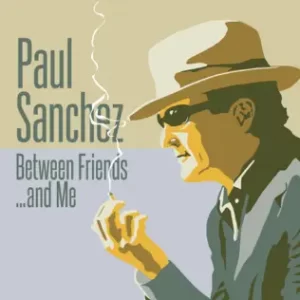When Paul Sanchez wrote a song, nearly 20 years ago, for Darius Rucker to sing, the Hootie frontman was not happy with its tone or title: “Nothing Here.” Rucker didn’t like the negativity, Sanchez notes now. Rucker changed the title and a few of the lyrics, and abracadabra… “Something Here.” Positively.
It’s all the difference in the world, of course. But what a world he was in at the time. Sanchez had lost his home in the flood, was vagabonding from city to city, couch to couch. Oh, and he’d left his long-time steady gig as a member of Cowboy Mouth. “Something Here” became a centerpiece of Between Friends, an album of songs Sanchez wrote to be sung by various pals—Rucker, John Boutté, Susan Cowsill, Theresa Andersson among them. The project was started before the flood and before he’d quit the Mouth. But in the wake of both, it took on new weight as not just a side-project but a launch of a solo career—an odd approach for that, but jump-started Sanchez’s post-Katrina embrace of the role of leader, mentor and cheerleader, bringing people together to sing, and rise, through the hardships. It’s something still manifest today in his ongoing communal Rolling Roadshow projects. “Something Here” indeed.
That song, and five others from that project, are back in new form as the digital EP Between Friends … and Me, with Paul Sanchez himself having re-recorded the lead vocals. These altered versions were done in 2015, when project producer Mike Mayeaux, having thought the original masters had been lost, found the tapes of these songs. But they sat until now.
Well, now carries some parallels to the then when the original album was made. On a larger scale, in the place of the flood was the pandemic, with its own psychic, as well as physical, dislocations. On the personal side, Sanchez found himself having to start anew, find his voice—not figuratively in light of leaving a band—but literally having lost his ability to sing due to dysphonia, from which he has only recently made a recovery. Even though the songs well-preceded all of that, they capture a lot of the attendant feelings.
“No Bothering You” opens things with New Orleans jaunt and Sanchez’s dry wit, presenting a total, chaotic mess (the singer) with the great fortune to be partnered with someone seemingly unflappable. Domestic bliss if it ever was. Bonerama’s Mark Mullins sang it with flair on the album, but Sanchez’s folkie-cabaret nonchalance is perfect. The somber “Denver” (previously sung by John Crooke) is a restless wanderer’s somber, self-aware fantasy of the “fool’s gold” of settling down. Sanchez gives it the perfect weary tone, echoed in its lone cello behind a lone acoustic guitar. “Lonely Wasted and Blue” is a Sanchez staple co-written with then-fellow Cowboy Mouth member (and later Rolling Roadshow mainstay) Mary Lasseigne. Theresa Andersson brought a lilting wink to the album version, but Sanchez’s devil-may-care tone gives some flips to the rag, recalling Dan Hicks. “Mexico,” previously sporting Cowsill (with Andersson then and now on violin) goes back to that disconsolate yearning to just be somewhere else, “far away from here where my future disappears.” But “Someone Again” (Sanchez here taking over from Kevin Griffin) points back to home, a faded (or never quite shining) star’s plea to one special person to give life meaning: “Say my name and I’m someone again.” And that leads, in the end, to at least some hope in “Something There”—with Rucker and Boutté as Sanchez’s backup singers, no less.
You could read too much into all of this, particularly in the parallels between post-Katrina, post-band life and where he is (and we are) today. His vocals, after all, were recorded in 2015. But you could read too little into it, half a dozen leftover remnants—barely 20 minutes in all, given a digital-only release.
At the very least, though, this is a step through the door for Paul Sanchez, the very talented and astute singer-songwriter. Here he shines the spotlight on himself, something that as good and valued as his collaborative projects have been had been given lesser focus, well before the pandemic and vocal issues. And that, most definitely, is something.




